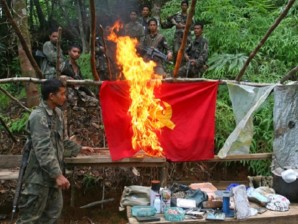Military exec vows to wipe out NPA in Quezon by year-end

Philippine Army Scout Rangers burn the Communist flag which they found after seizing a large NPA Camp in Sitio Madarik, Barangay Umiray General Nakar, Quezon. INQUIRER FILE PHOTO
LUCENA CITY, Philippines – An Army official in Quezon predicted that the communist New People’s Army (NPA) rebels in the province would be wiped out before the end of 2012.
“By the end of the year, the NPA in Quezon will be reduced into inconsequential level,” Colonel Eduardo Ano, commander of the Army’s 201st Infantry Brigade, said in a phone interview Saturday afternoon.
Año said after 2012, the battle against local insurgency will no longer be the job of the military but of the police.
When asked to explain the basis of his optimistic prediction, Año said: “One of the important indicators was the feedback from the civilian population that they are now relatively safe from NPA harassment and terrorism”.
“There is now a prevailing atmosphere of peace and contentment even in remote areas that were used to be under communist influence. That’s the kind of psychological environment conducive to peaceful solution of the armed conflict,” the military official explained.
Article continues after this advertisementAño said the military will just focus on supporting local officials on their efforts to bring the government closer to the people through unhampered delivery of social services.
Article continues after this advertisement“The battle against communist insurgents will be reduced into law enforcement level,” he explained.
Senior Supt. Valeriano de Leon, Quezon police chief, declared that the provincial police force was ready for the task.
“We’ve long been preparing for that. We’re ready,” De Leon said.
Based from their latest intelligence information, Año said, the remaining NPA rebels operating in their jurisdictions – central and southern part of Quezon – have been reduced into a ragtag band of 34 armed combatants.
“Our target is to wipe them all – either to convince them to surrenders, capture or kill them in combat – or reduce them to only 10 or less armed rebels,” Año explained.
Efforts to get the reaction of the NPA-Quezon leadership through mobiles phones proved futile.
Lieutenant General Roland Detabali, commander of the military’s Southern Luzon Command based here in Camp Nakar, said the rebel’s declining strength and influence in Southern Tagalog and Bicol regions can be attributed to the active implementation of the military’s “Oplan Bayanihan”.
“Oplan Bayanihan” shifts the focus of the military strategy to quash the communist insurgency and Muslim secessionist rebellion away from traditional combat operations to “developmental activities” which also gives importance to the protection of human rights.
Human rights organizations, however, blamed “Oplan Bayanihan” as another scheme of the military to terrorize the people in the countryside not to support the NPA rebels.
The military during the time of former President Gloria Macapagal–Arroyo predicted but failed to end the communist insurgency before 2010.
According to the AFP report, the NPA’s strength in 2011 declined to 4,043 armed guerrillas, lower than the previous year’s 4,384 from a peak of 24,430.